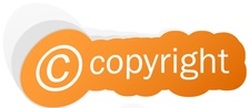As a starting point, let’s revisit the definition of a Copyright: Copyright – the exclusive right of the author or creator of a literary or artistic property (such as a book, movie or musical composition) to print, copy, sell, license, distribute, transform to another medium, translate, record or perform or otherwise use (or not use) and to give it to another by will. Now let’s narrow down what types of property fall into the category of copyright: Literary, musical and dramatic works, periodicals, maps, works of art (including models), art reproductions, sculptural works, technical drawings, photographs, prints (including labels), movies and other audiovisual works, computer programs, compilations of works and derivative works, and architectural drawings are all works that may be protected by Copyright Law Not falling into the category of copyright are: Mere ideas, short phrases, titles, extemporaneous speeches or live unrecorded performances, common information, government publications, and seditious, obscene, libelous and fraudulent work are not protected by Copyright Law How do you Protect your authored or created work?Copyright is a really interesting type of Intellectual Property (“IP”) Law because unlike many other parts of IP Law, a Copyright is instant. As soon as the work is created in a tangible form, it automatically has a federal (nationwide) copyright. To demonstrate this copyright, a notice should be affixed stating the word copyright, copy or ©, with the name of the creator and the date of copyright (which is the year of first publication). However, to enforce the nationwide copyright protection, the author or creator must file with the U.S. Copyright Office by submitting a registration form and two copies of the work with a fee. This establishes proof of the earliest creation and publication of the property, it is required to file a lawsuit for infringement of copyright, and establishes a right to attorneys’ fees in a copyright infringement suit. To be clear, an author or creator only may only enforce a claim of Copyright infringement if the Copyright has been filed with the U.S. Copyright Office. Even when an author or creator has Copyright registered with the U.S. Copyright Office, preventing Copyright infringement requires constant attentiveness. Practical Steps to take in Protecting your CopyrightFirst, you should include a copyright notice on your property; if you are particularly concerned, you may also post a do not copy badge or sign along with the property. Second, build proof that the idea is yours by saving earlier versions or iterations of your property. Third, the creator of a property that has a federally registered copyright needs to monitor for instances of plagiarism or copies made without permission. This includes all uses of your copyrighted property that is not attributed it to you, the author or creator. Fourth, if you find plagiarism, take action:
A creator does have significant rights in Copyright if the Copyright is registered with the U.S. Copyright Office, but an unregistered Copyright will leave the author or creator little legal recourse if their work is used or copied without permission. Finally, Copyrights have a long initial life (the life of the author + 50 years). However, the author or creator must remain proactive in enforcing the Copyright with vigilance if the the author or creator wants to prevent others from using or copying the protected property. Confused about Copyright?Notice: This page is attorney advertising and does not establish an attorney-client relationship, which is only formed when you have signed an engagement agreement. No information provided to Initiate Advancement Legal Solutions will be confidential unless an engagement agreement has been signed between you and the firm. All information provided is not advice, and should be relied upon as such. Engage your own attorney to address your unique legal needs. We cannot guarantee results; past results do not guarantee future results.
© Copyright Initiate Advancement Legal Solutions | Terms & Conditions | Privacy Policy
1 Comment
|
Author: Aimee HaynesI motivate, I blog, I listen, I give advice, I help, I create, I work with others, I stand my ground when needed, and I am always open to new ideas. In addition to the qualities that define me most, I'm also a Corporate Law attorney working with entrepreneurs, creatives, and small businesses to help them achieve success.. Archives
September 2016
Categories
All
|
 RSS Feed
RSS Feed
